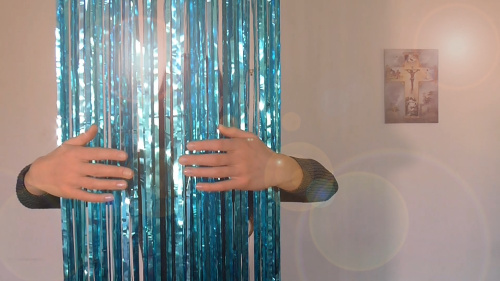EDWA 2020: Zahra Killeen-Chance and Neza Jamnikar
Herald Theatre, Aotea Centre, Auckland
04/12/2020 - 04/12/2020
Experimental Dance Week Aotearoa 2020
Production Details
Zahra Killeen-Chance, Elliptical Fiction
Elliptical Fiction is an exploration of the curve evolving out of the line, and the line evolving out of the curve. This movement provocation suggests an ongoing oscillation between two seemingly opposing ideas: ellipse and line. Elliptical Fiction seeks to reflect the Taoist philosophy of yin and yang through an investigation of the reciprocal relationship between hard and soft, fast and slow, seen and unseen, individual and collective, line and curve. It aims to reveal how binary opposites are mutually dependent, and how neither side of an opposition is superior to the other. The costuming is an integral element of the performance and the movement has been developed in relationship to it. In this way the costuming is part of the choreography itself.
The movement and philosophy of the work are influenced by the teachings of Tai Chi. Whilst on an Asia New Zealand Foundation Residency in Taipei, Zahra studied Tai Chi under Master George Lin. During her time there she explored ways to incorporate these ideas into her movement vocabulary for the development of solo and group performances. This solo performance was developed and performed during Zahra Taipei artist residency in 2017.
Neža Jamnikar: Love, instantly!
Love, instantly! is a kitsch work by Neža Jamnikar, in movement collaboration with Maryam Bagheri Nesami, Brittany Amber Kohler and Evie Logan, and sound collaboration with james risbey.
It is a research of the phenomenon of kitsch –
cheap objects on display
imitation, pretence, and phony feelings
nostalgia, sentiment, and safety
routines, clichés, and hierarchy of taste
fantasies, nightmares, and archetypes creating political kitsch
God’s country, class division, and cultural elite
It is a marching propaganda.
A Kinkade’s Christmas Cottage.
Herald Theatre 7pm
Performance installation , Multi-discipline , Experimental dance , Dance , Contemporary dance ,
1 hour
Mining form in triple bill
Review by Sue Cheesman 06th Dec 2020
Elliptical Fiction begins as solo dancer Zahra Killeen-Chance enters the stage in darkness and takes very deliberate slow steps towards and into a large pool of light up stage centre. The sound score aptly accompanies the piece and initially bird sounds dominate. The walking pattern changes and the movement becomes more circular, including the revealing of the lower bare legs bathed in light.
The black costume has associations to martial art but looks far more chic in its design. It plays an integral part in the choreography, allowing the dancer to stretch in it, concealing bare legs and arms and producing very effective contrasts between pale skin tones and dark black costume. Tai chi foundations are evident in the movement vocabulary, including deep squats and hand and arm patterns typically found in this form.
At times the pale skin on the arms slices through the darkness forming momentary angles and straight-line air patterns creating a flat 2-dimensional perspective. Particularly striking at other points are the uncovered arms powerfully soaring, circling, gilding through the space like a giant bird.
The piece effectively oscillates through many opposites in reference to Taoist philosophy of Yin and Yang – fast and slow, light and dark shades, circular and angular movements, line and curve, seen and unseen. Well performed, this piece leaves us questioning whether any one side of these binaries is more dominant.
The second work by Zahra Killeen-Chance, Strata, is a film predominantly.
The film places a dancing body in various sites within a suburban house and its backyard. The dancer is clothed in a knitted dress with large train and the material completely covers the head and face, hence the description a body. The clearly shot film cuts from one scene to the other in each of which we find the dancer in a different relation to the environment. Movement, the majority of the time, is arms and hands only, giving the impression of the dancer being installed in the space. We are left to question with each frame the relationship between the body and the space/environment they are in.
Neža Jamnika’s Love, instantly! is a clever take on the phenomenon of Kitsch. The word score is a critique of Kitsch underscored with a powerful social commentary. This text cleverly weaves a number of definitions of kitsch laced with humour and irony. At the beginning dialogue is read live as the reader passes through the audience to the stage. At another point it acts as a somatic score for the two dancers, telling them what to do, but the response from the dancers in movement and relationship is clever and funny often subverting the instructions.
One corner of the stage has wall-to-ceiling blue tinsel curtains and on the floor in a rectangle are neon-coloured strip lights. The dancers dance in this “club” space by themselves using somewhat cliched movements with the odd nonchalant restrained connection or touch. Is this a nod to nostalgia, or to cheap objects on display?
The dancers’ placements on stage and movement vocabulary change with each section from skipping to more contemporary phrases to individual motifs.
The set, props, text and movement content are all cleverly woven together through an episodic lens to critique the notions of imitation, pretence, nostalgia, sentiment, safety, routines, clichés, hierarchy of taste and phony feelings. Neža Jamnika has worked in movement collaboration with Maryam Bagheri Nesami, Brittany Amber Kohler and Evie Logan, and sound collaboration with James Risbey managing to interrogate the trappings of kitsch under the microscope to create a stunning and witty piece. Fittingly the piece finishes with all three dancers blowing a kiss, not to us as audience but on the diagonal to the wall stage right – we as audience laugh loudly.
Copyright © in the review belongs to the reviewer





Comments